- Home
- P. D. James
Time to Be in Earnest Page 14
Time to Be in Earnest Read online
Page 14
SATURDAY, 11TH OCTOBER
I was driven to Cambridge by Will Atkinson of Faber through continuously slanting rain to sign books at Heffer’s. We were fortunate to find a parking space in the garage close to the shop, and then dashed through the downpour into Waterstone’s to sign stock. The queue at Heffer’s was long by half-past twelve, and progress slow, mainly because of greeting old friends. Afterwards, as usual, Heffer’s provided luncheon in the boardroom and I gave an interview for the local radio. Grandson Tom and his new wife Mary appeared and Will and I called in at their house for tea before driving back to London in the early evening.
TUESDAY, 14TH OCTOBER
To the Booker dinner with Rosemary Goad, who has edited all my books. It was one of the most enjoyable Booker dinners for us, largely because we shared a table with Anne Elletson, late of Faber and now a BBC producer, who is always a delight to meet. Others at our table were Clare Short with her newly discovered son; Martyn Goff, administrator of the Prize, and Geordie Greig of the Sunday Times. There was some muttering about the choice of winner, but not, of course, from Martyn, who is always a model of discretion. All members of the Booker Management Committee are sent copies of the shortlist and I have made a start with the winner, Arundhati Roy’s The God of Small Things, but haven’t got very far. It seems to me somewhat lush and overwritten, a beginner’s attempt at a Naipaul or a Rushdie. But I admit to prejudice: I seldom enjoy books seen through the eyes of children, The Go-Between being a notable exception.
In announcing the prize, the Chairman, Professor Gillian Beer, suggested there was merit in finding a first novelist as prize-winner; I think this is a mistaken view. The Booker jury are there to reward the best novel of the year. Was this the best? Hardly, I felt. But then, if we set up ten different juries of five, it is unlikely—except in a rare year—that they would award the prize to the same book.
Next year will mark the thirtieth anniversary of the Booker Prize. On the whole I think it has succeeded in its aim of celebrating the best of contemporary fiction, although there have been years in which it was difficult to see the winning novel as even worthy of the shortlist, let alone the accolade of best novel of the year. But the prize has always been controversial and this isn’t surprising and is, perhaps, part of its appeal. When I chaired the panel of judges in 1987 with Selina Hastings, Allan Massie, Trevor McDonald and John B. Thompson as my colleagues, we recognized at our first meeting that literary judgement is inevitably subjective and that one person’s masterpiece is another’s pretentious and incomprehensible absurdity. For this reason we agreed never to impugn each other’s taste.
The problem for the judges, which existed when I was Chairman and still exists, is the number of entries. By the time I had got to the hundredth novel I was beginning to doubt my own judgement. The Management Committee has made efforts to cut down the number of entries, but too many novels are entered which hardly merit publication, let alone gaining the shortlist. Then there is the problem that publishing houses with a distinguished list can enter only the same number as smaller houses which may only have published a couple of novels. The entry is further complicated by self-publication, and now by publication on the Internet. Somehow the numbers will have to be reduced, but how?
If I were in sole charge of a literary prize I would arrange things differently. I would appoint a panel of a dozen or so people consisting of literary editors, well-regarded reviewers, booksellers and members of the general public who are lovers of fiction. Each member would submit a list of up to fifty novels which he or she thought worthy of consideration, although there would be no obligation to read all of them. From the total it would be possible to compile one list of fifty novels from those which appeared most frequently. The judging panel would select the winner from this fifty, but they would also have the option of calling in an additional ten. In this way the reading task would be far more manageable, it is unlikely that any novel of merit would be overlooked, and the panel would still have the power to call in a book by a previously unknown author which didn’t appear on the shortlist.
It is for the Chairman of the Booker panel of judges to decide how the judging panel shall carry out its job, although it is expected that all members will read all the novels. The worst way of arriving at the ultimate shortlist of some five or six is for each panel member to nominate his or her favourite. I believe this was done one year, but it is difficult to see how it could result in a generally accepted first choice. I wanted to achieve a shortlist of novels which all the judges thought worthy of the prize even though we each had a particular favourite. The shortlist is inevitably a compromise. I would certainly have included at least one novel, Ian McEwan’s A Child in Time, which another judge heartily disliked and spoke against very strongly, so the five of us would probably, if judging alone, have produced five different shortlists. One has to remember that the Booker novel can’t reasonably be regarded as the best novel of the year—only time will determine that—but is simply the book which five very different people, brought together at one moment in time and after being sated with months of fiction reading, feel is worthy of the Prize. Our final choice of Penelope Lively’s Moon Tiger was only arrived at after a long argument which nearly made us late for the Guildhall dinner, and the choice was not unanimous.
The Booker, like most literary prizes, has probably given more pleasure than pain, has certainly stimulated interest in fiction and has provided its share of entertainment, controversy, malice and general ill will. But if I were trying to encourage a young person to read and enjoy modern fiction I am not sure I would begin by presenting him or her with the Booker shortlist.
MONDAY, 20TH OCTOBER
On Thursday afternoon I flew to the Isle of Man to give a lecture in St. German’s Cathedral, organized by the Friends of the Cathedral, on Friday, and an afternoon talk on Saturday to the island’s Prayer Book Society. I stayed with Mrs. Salisbury-Jones in her stone house in the centre of Castleton. From my top-floor window I could glimpse the sea which, under the red and gold sky of early morning, looked like a sheet of gleaming metal. Even the sand was golden-yellow. Mrs. Salisbury-Jones was welcoming and hospitable and took great trouble to show me the island on Saturday morning and on Sunday.
The architecture is generally undistinguished but the island itself much more interesting and attractive than I remembered from one previous visit. It seems that all the variety of scenery found in the rest of the United Kingdom is present in this small island. The charming little ports reminded me of Dorset and the West Country. The central hills with the valleys and streams were like parts of Scotland, while the plain in the west leading down to a pebbled shore with dunes and marram grass and great round stones reminded me strongly of East Anglia. The weather was wonderful and I shall retain a very clear memory of Sunday afternoon when we drove to Peel. We found a seat against the castle walls and sat in the strength of the mellow sunshine looking across Peel harbour and eating particularly good crab rolls.
I liked the inscription on Bishop Sam’s tomb in the ruins of the Cathedral: “In this house which I share with my brothers the worms in hope of the resurrection to life lie I, Sam, by divine grace Bishop of this Island. Stay reader, look and laugh at the Bishop’s palace. Died 30th May, Anno 1662, Samuel Rutter, Lord Bishop of Sodor and Man.”
THURSDAY, 23RD OCTOBER
This evening I spoke at a joint Times-Dillons literary event at the Institute of Education. I was apprehensive that there wouldn’t be much of an audience, since the charge of £10 seemed to me high. However, there were about 350 people present; an interested and very warm audience. There was no shortage of questions, and a long line at the subsequent signing.
Afterwards, Peter Stothard, the editor, took about twelve of us out to dinner at the Etoile, where I sat next to the Deputy Chief Constable of Thames Valley Constabulary. He offered to show me a murder incident room when I am next in Oxford, and this will be helpful. Apparently some of my details in Original Sin were n
ot totally accurate.
Not all the questions after a talk are about my work. Some people expect me to be an expert on crime fiction (which I am not), and I’m frequently asked about my response to real-life crimes and to the death penalty. I reply that I have always been an abolitionist, but that this stance is hardly rational since I do believe that the death penalty deters. I am, therefore, prepared to see people put at additional risk of being murdered rather than live in a country which enacts the death penalty. I expect my hatred of the death penalty is influenced by my horror of hanging, surely a barbaric if effective way of putting people to death.
It seems to me that when I was a child there was far more public and newspaper interest in murder trials than there is today. Perhaps those detailed accounts, often with photographs, satisfied the public’s fascination with murder which, today, is catered to by television series on crime and the police. I can remember the pages of broadsheet which covered the trial in 1931 of Alfred Arthur Rouse, who murdered a hitchhiker whose identity is still unknown, and can recall the newspaper pictures of the burnt-out car. But the murder which evoked a personal response was that of Vera Page, also in 1931, perhaps because, like me, she was an eleven-year-old. Her body—she had been raped and strangled—was found on the morning of 16th December in the tradesmen’s entrance of a house in Addison Road, Kensington. She had gone after school to show her swimming certificates to her grandmother and never returned home. I can clearly recall her face from the newspaper photographs: dark haired, and with the eager bright-eyed look of a child for whom life is an enchantment. A neighbour, Percy Orlando Rust, was an obvious suspect. He had worn a finger bandage similar to one found on the body, he had no alibi, and there were other physical clues linking him to the crime. During questioning by the coroner a woman stood up in court and shouted, “That man is telling lies, sir.” But the coroner’s jury found the evidence against Rust insufficient and no one was ever brought to trial. It still seems inexplicable to me that the police, provided with so much physical evidence, couldn’t solve the case. Today, with DNA, there would be no difficulty. It is extraordinary how that child’s face is imprinted on my imagination. Perhaps there persists in the human psyche an atavistic belief that a murder must be solved if the dead are to rest in peace.
TUESDAY, 28TH OCTOBER
Gill Frost arrived to give me a massage at 8 a.m. and at 9:30 a journalist rang from New Zealand for a telephone interview, followed by a call at 10 o’clock from an Australian journalist.
In the afternoon Andy arrived with Rosemary in the car to drive us to Chipping Norton for a talk in the small theatre there, followed by a signing. Rosemary has her left arm in a sling as she fell on the rocks at Purbeck during the weekend and broke her wrist. We went first to have supper with Penelope and Jack Lively at their medieval farmhouse at Great Rollright. They then drove us to Chipping Norton, where Andy had taken his car to find himself a pub meal, and be ready later to drive us back to London.
The theatre was full, the audience lively and encouraging with particularly good questions, although I was very tired at the end of the session, trying to sign for stock while being interviewed simultaneously by a local journalist. But this was a very worthwhile signing, arranged by Elizabeth Sleight, who is the proprietor of a small independent bookshop in Chipping Norton and is dedicated, enthusiastic and successful in attracting writers to talk and sign.
I was asked, as I often am, about one of the novels which isn’t a detective story and doesn’t feature Adam Dalgliesh: Innocent Blood. This is the only one of my novels influenced by a real-life murder case. It had, in fact, a twofold genesis: a murder and an act of Parliament.
The inspiration first came when I was working at the Home Office and was concerned with some of the provisions relating to care orders in the Children’s Act 1975. This was a DHSS not a Home Office Bill, but my division had an interest in the provisions relating to juvenile courts. But the Bill was primarily concerned with adoption. Adoption proceedings were confidential. A mother placing her child for adoption would not be told the name of the adopters and they would not know the identity of the birth mother. An adopted child would grow up with no way of finding out its natural parentage. Parliament took the view that young people had a right to this knowledge, even though it meant breaking faith with both those who had adopted a child under the previous arrangement and those who had parted with a child in the assurance of secrecy. The Bill provided that a young person of eighteen, after counselling with a social worker, should be able to see his or her birth certificate and have the possibility of beginning a search for the natural parents.
The murder, which took place some years before the abolition of capital punishment, was the case of Daniel Raven. Raven’s wife had recently given birth to their first child, a son, in a Muswell Hill nursing-home. The young father called to visit his wife and, on the way home, went to the house of his parents-in-law, a Mr. and Mrs. Goodman, and battered them to death with a television aerial. He was an obvious suspect and the police were not short of damning evidence, including his bloodstained clothing which he had attempted to burn. He was tried, convicted and hanged. When I heard on the radio that Daniel Raven had been executed that morning for the murder of the Goodmans, I thought primarily not of him, nor of his victims, but of the young mother and her baby. How, if ever, could she break the news? What would she answer when her son asked why he had no father or what had happened to his maternal grandparents? Imagining myself in her place, I wondered whether I would even consider placing the child for adoption.
When the Children’s Bill was going through Parliament, the memory of this case surfaced and the idea for the novel was born. I would write about an eighteen-year-old, a highly intelligent but unloving girl adopted by a psychologist and his wife, who began to search for her parents. She would have fantasized about her earlier life; that her father was an aristocrat, her mother perhaps a servant girl in the ancestral home. She would discover that her father had murdered a young girl, her mother had colluded, and that both had been sentenced to life imprisonment. Her father had died in prison, but her mother was soon to be released on licence. The book would have a double theme: a crime story relating how the father of the dead child, patiently waiting for the release of the convicted woman, begins to track her down in London; secondly the growth of love between the daughter and the mother after the daughter’s decision that they should set up house together.
Although the novel didn’t begin with a place, setting is as important to Innocent Blood as it is to my detective stories. The father of the murdered child, Norman Scase, tracks his daughter’s murderess through London. The city’s Underground system, its raucous street markets, lanes and streets, and the darkly numinous roof of Westminster Cathedral are all integral parts of the story. Innocent Blood was one of three novels—the other two being Death of an Expert Witness and A Taste for Death—which could not have been written, or at least written with such authority, without my Home Office experience.
Perhaps this is why I carried on working years after it would have been possible to live by my writing—if occasionally precariously. I found that to be part of the working world was a powerful inspiration as well as providing useful background information. And it was Innocent Blood which made me prosperous. Before it was published, I had decided to leave the Home Office six months before my retirement date and had carefully calculated that I would be able to live in reasonable comfort until I received my lump sum and pension in August 1980. The book was modestly successful in Britain. It came at a difficult time for my publishers and was meanly produced, but in the States it rapidly became number one on the New York bestseller list and received rave reviews. The film and paperback rights were sold in the same week. Innocent Blood meant the end of anxiety about money, and for that I was grateful.
The film was, in fact, never made, but to sell a lucrative option without having to watch the result on the screen is considered by many writers to be an advantage. Prod
ucers still occasionally want to make it, but the company with the rights is holding on to them.
November
SUNDAY, 2ND NOVEMBER
I have just had a highly enjoyable if exhausting weekend. Eliza Oxley had asked me some months ago if I would talk at a dinner in aid of the Charminster Conservative Party, the dinner to be held at Wolfeton, one of the oldest and most historic country houses in Dorset. I would have driven down with Rosemary, but because of her broken left wrist she can’t drive. So Andy again took charge and we drove down, using minor roads where possible, under a sunny sky and through autumn foliage to Stockbridge. There we first had a walk round the craft shop, where Rosemary bought me a necklace as an early Christmas present, and then went to the Vine pub for lunch.
At Charminster House, where I was to stay overnight, I rested while the others went to finish preparations at Wolfeton. The evening was hugely enjoyable. There were torches flaming to show us the way to the massive gatehouse flanked with two solid towers. Wolfeton must be grim and probably cold when uninhabited, but with great log fires and banks of candles it looked wonderful. It was a typical and perfect Agatha Christie evening. The oak-panelled rooms, the pictures, the flickering candles and the mysterious shadows made Wolfeton the ideal setting for a 1930s mystery. Even the names on the table-plan were entirely in keeping—and I found myself allocating my fellow diners to their appropriate roles—Captain Gueterbock, Brigadier Proudman, Mrs. Mould-Graham, Miss Archdale and Captain Thimbleby all have the authentic Christie ring. The guests arrived in a mood to enjoy themselves and my after-dinner talk received more praise and applause than it deserved.

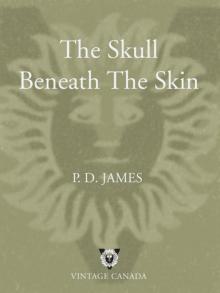 The Skull Beneath the Skin
The Skull Beneath the Skin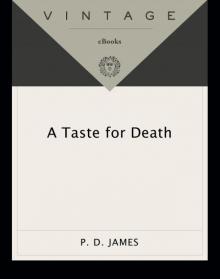 A Taste for Death
A Taste for Death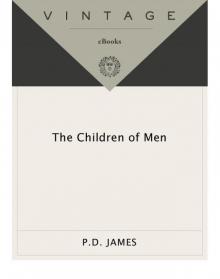 The Children of Men
The Children of Men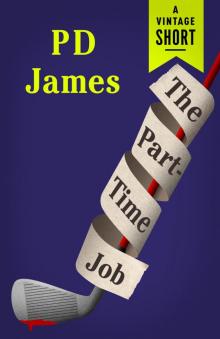 The Part-Time Job
The Part-Time Job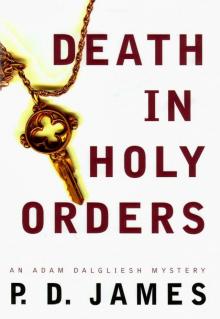 Death in Holy Orders
Death in Holy Orders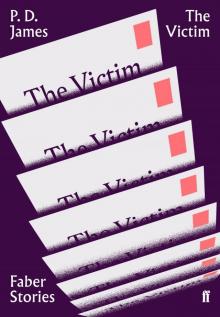 The Victim
The Victim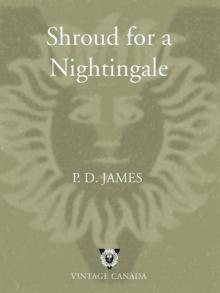 Shroud for a Nightingale
Shroud for a Nightingale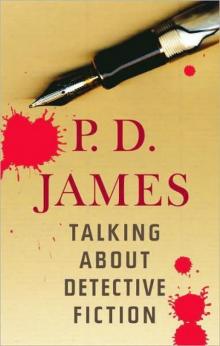 Talking about Detective Fiction
Talking about Detective Fiction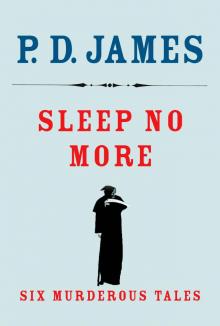 Sleep No More
Sleep No More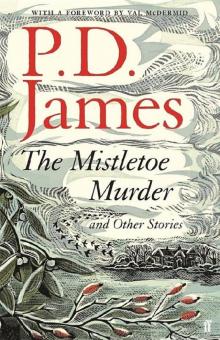 The Mistletoe Murder and Other Stories
The Mistletoe Murder and Other Stories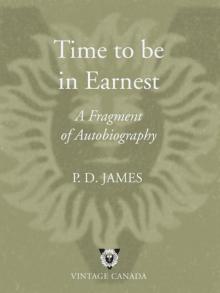 Time to Be in Earnest
Time to Be in Earnest Original Sin
Original Sin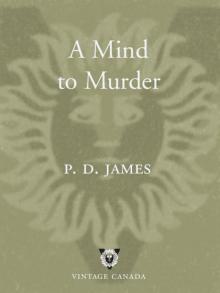 A Mind to Murder
A Mind to Murder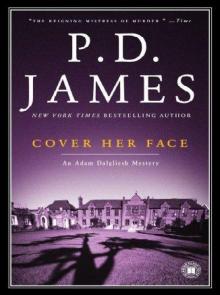 Cover Her Face
Cover Her Face Innocent Blood
Innocent Blood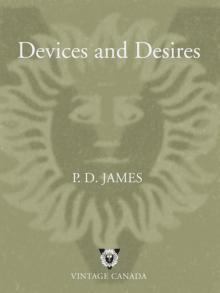 Devices and Desires
Devices and Desires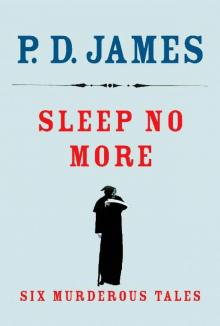 Sleep No More: Six Murderous Tales
Sleep No More: Six Murderous Tales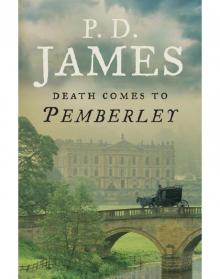 Death Comes to Pemberley
Death Comes to Pemberley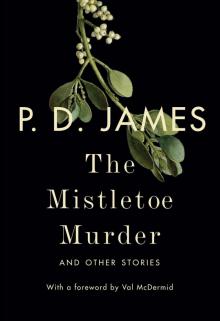 The Mistletoe Murder
The Mistletoe Murder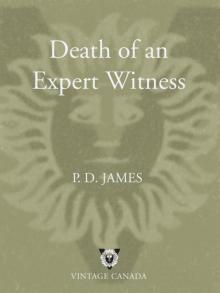 Death of an Expert Witness
Death of an Expert Witness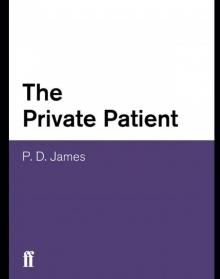 The Private Patient
The Private Patient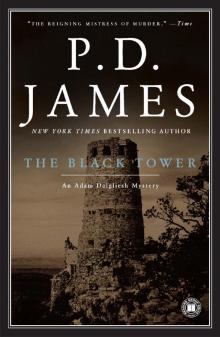 The Black Tower
The Black Tower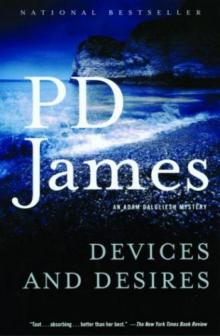 Devices & Desires - Dalgleish 08
Devices & Desires - Dalgleish 08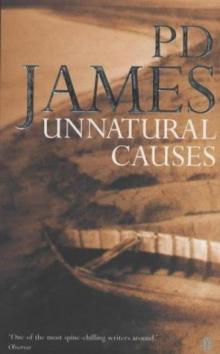 Unnatural Causes
Unnatural Causes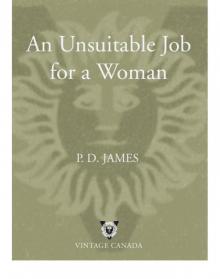 An Unsuitable Job for a Woman
An Unsuitable Job for a Woman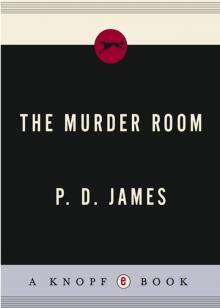 The Murder Room
The Murder Room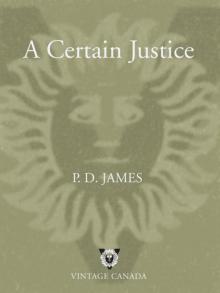 A Certain Justice
A Certain Justice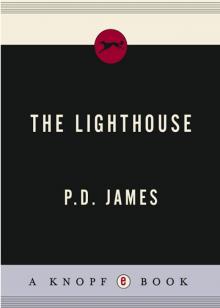 The Lighthouse
The Lighthouse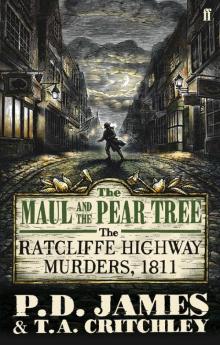 The Maul and the Pear Tree
The Maul and the Pear Tree